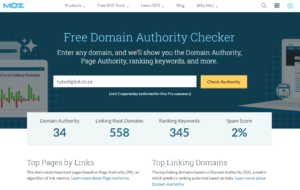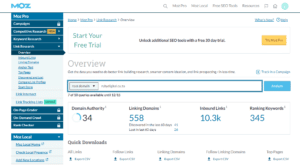Domain Authority (DA) is a metric created by Moz that predicts how well a website will rank in search engine results pages (SERPs). While it’s not an exact science, it can be an extremely helpful tool for website owners and SEOs when used correctly. Domain Authority is a complex topic with lots to unpack – so prepare yourself for a deep dive into the subject!
In this post, we’ll look at:
- What Domain Authority is and how it’s calculated
- How to use Domain Authority to improve your website’s ranking
- When (and when not) to measure Domain Authority
- How DA differs from similar metrics like PA (Page Authority), DR (Domain Rating), and PageRank
- The SEO value of DA – including how to measure it, what a good score is, and how to improve it
- Issues and challenges associated with DA
Let’s get started!
What is Domain Authority?
Domain Authority is a ranking score developed by Moz that indicates how well a website should perform on search engine results pages (SERPs). A Domain Authority score ranges from 1 to 100, with higher scores corresponding to a greater ability to rank. It’s important to note that DA is NOT a Google ranking factor, but rather a way to gauge and track your website’s expected performance against competitors.

How is DA calculated?
Moz calculates the DA of a website by taking into account over 40 signals, including:
- Total number of incoming links, as well as the quality of those links
- Domain age
- Website content quality
- Social Signals (popularity of your site on social platforms)
- Overall SEO performance
The specific algorithm used to calculate DA is not made public, however, we do know it’s a logarithmic scale – meaning that it gets harder to improve your DA score as it gets higher.
Domain Authority 2.0: Moz’s update to Domain Authority
In 2019, Moz updated its Domain Authority metric in an attempt to make it more accurate and reflective of real-world results. The update, called DA 2.0, made a number of changes to the way DA is calculated.
The most significant change was the introduction of a new link model, which more accurately reflects how links impact SERP rankings. The new model gives more weight to links from websites with a high MozRank, and less weight to links from low-quality websites.
In addition, DA 2.0 considers the total number of linking root domains (the number of unique websites that link to a website), rather than just the total number of links. This means that a website with fewer high-quality links can have a higher DA score than a website with more low-quality links.
Another big plus is how often domain authority updates, which is now daily. Finally, the update also introduced a new “spam score” metric, which penalises websites with a high number of low-quality links. This is designed to make DA more resistant to link spamming and other black-hat SEO tactics.
Find out more about high-quality link building here.
Differences between DA and other similar metrics
Difference Between Domain Authority (DA) and Page Authority (PA)
Domain Authority and Page Authority were both developed by Moz, and both are designed to predict how well a website will rank on SERPs. However, there is a key difference between the two: Domain Authority measures the strength of an entire domain, while Page Authority only measures the strength of an individual page. This can be useful when you’re trying to evaluate how well content – such as an individual product page – will perform for a certain keyword.
Domain Authority (DA) vs Domain Rating (DR)
Domain Rating (DR) is a metric developed by Ahrefs. Like Domain Authority, it gives a site a score out of 100. The difference however is that Domain Rating chiefly focuses on a site’s backlink profile – in other words, how many external sites point to you, and whether they’re good quality links or not.
So when it comes to building your backlink profile, Domain Rating scores for the sites you intend to try and get links from are more useful than Domain Authority scores. You can also use your competitors’ DR profiles as a marketing tool to look for keywords and topics you could add more content for.
Domain Authority (DA) vs PageRank (PR)
PageRank is a metric created by Google (named after Larry Page) that assigns a numeric value to each webpage on the internet, based on the number and quality of inbound links. Remember that Google sees high-quality links from external sources as a vote of confidence for the quality of your content.
Google actually did away with making a website’s PageRank publicly available back in 2016, as too many SEOs and site owners were obsessing on this one figure, and resorting to all sorts of unsavoury practices (like spamming unsuspecting blog post comment sections with links) in an attempt to artificially inflate their own website’s PageRank.
While some argue that PageRank is dead, it can still be an important metric to consider as a signal of your website’s quality. Unlike PageRank, Domain Authority is not something that can be manipulated by SEOs or website owners, as it’s based on data from Moz’s own Link Explorer tool, as well as data from other third-party sources.
The SEO Value of Domain Authority
How to check your DA?
Moz’s Link Explorer is the easiest way to check your website’s DA. Simply enter your URL into the search bar and hit “explore.”

Your website’s DA will be displayed on the right-hand side, under the “Domain Authority” heading. There are also plenty of other free tools available online to check your (or a competitor’s) DA.
How to measure Domain Authority
A Domain Authority score ranges from 1 to 100, with higher scores corresponding to a greater ability to rank. While your DA score is just one small part of the ranking puzzle, it is still an important metric to be aware of.
Compare your DA score with that of your competitors. This will give you a good idea of where you stand in terms of ranking potential. If your competitors have a higher DA score than you do, it’s a good indicator that you need to step up your SEO game.
Use your DA score as a gauge, but don’t base your SEO company’s success on it. Your DA score is just one metric out of many that you should be taking into consideration. If you’re solely focused on increasing your DA score, you could end up neglecting other important aspects of SEO. So, while it’s important to keep an eye on your DA score, don’t let it become the be-all and end-all of your SEO efforts.
What is a good Domain Authority?
When it comes to Domain Authority (DA), there’s no such thing as a good, average, or bad score. Instead, it’s all about comparisons. DA is a relative metric that measures how well a website is likely to rank on search engines.
In other words, don’t focus on setting a target DA score without considering the bigger picture. Instead, use DA as one tool in your arsenal to help you better understand how your site stacks up against the competition.
Is Domain Authority a Ranking Factor?
The short answer is: no. However, if your competitor has a higher DA, it may be an indication that they have more authority than you and as a result, may be ranked higher than you for certain keywords. Therefore, while DA isn’t an official ranking factor, it’s still worth paying attention to.
Why is DA Important for SEO?
Domain authority is an important metric to use when measuring the progress and popularity of your website. However, it’s important to keep in mind that domain authority is not a measure of how your website will rank. It’s simply a tool that can be used to identify potential areas of improvement.
Additionally, domain authority shouldn’t be the only metric you use to track progress. There are many other factors that contribute to SEO success, and it’s important to take a holistic approach. However, if you’re looking for a quick way to gauge whether your site is gaining popularity, then checking your domain authority is a good place to start.
What DA isn’t (The Issues with DA)
Now that we’ve got a good grasp on what DA is and how to use it, there are some challenges to be aware of.
- DA score always starts at 1 for new websites, so if you’re launching a brand-new site, it won’t be helpful straight away.
- It becomes more difficult to move the needle as your DA gets higher because of its logarithmic nature. Be prepared for it to get harder as you go!
- DA can decrease without it being anyone’s fault. Moz updates its index regularly, so it’s perfectly normal for scores to fluctuate. Unless you’ve made dramatic changes to your website, don’t panic if this happens. Rather wait and see if it normalises once more before taking any drastic action. If you’re worried, check to see whether your competitors’ scores have also dropped.
- Remember that your DA score is a comparison against ALL websites (even very high DA websites) that have a DA score, which is why you need to compare with your closest competitors for it to be meaningful.
- DA should never be used as the only indicator of how successful your website is, and other website authority metrics like Domain Rating and SEMRush’s Authority Score are available too.
- Finally, always remember that relevance is what really matters. When trying to improve your Domain Authority, always ask yourself:
- Is this link contextually relevant?
- Is this content valuable to visitors?
In that spirit, we hope you’ve found today’s post on how domain authority works informative and useful! And remember, whether you’re looking to boost your website’s visibility in search results or simply want to ensure that your site is performing at its best, Ruby Digital can help. Contact us today to find out more about our SEO services, or check out some of the below articles for more details on why domain authority is important.



